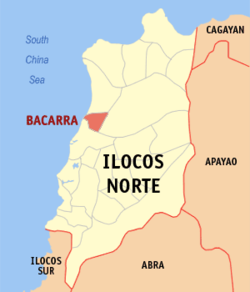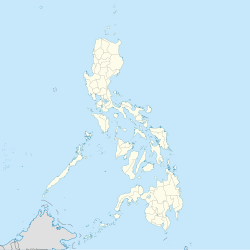Bacarra, officially the Municipality of Bacarra (Ilocano: Ili ti Bacarra; Tagalog: Bayan ng Bacarra) is a 3rd class municipality in the province of Ilocos Norte, Philippines. According to the 2020 census, it has a population of 33,496 people.[3]
Bacarra | |
|---|---|
| Municipality of Bacarra | |
 Bacarra Municipal Hall | |
 Map of Ilocos Norte with Bacarra highlighted | |
Location within the Philippines | |
| Coordinates: 18°15′07″N 120°36′39″E / 18.251886°N 120.610714°E | |
| Country | Philippines |
| Region | Ilocos Region |
| Province | Ilocos Norte |
| District | 1st district |
| Founded | 1778 |
| Barangays | 43 (see Barangays) |
| Government | |
| • Type | Sangguniang Bayan |
| • mayor of Bacarra[*] | Nicomedes C. dela Cruz Jr. |
| • Vice Mayor | Jose A. Pilar Jr. |
| • Representative | Ferdinand Alexander A. Marcos III |
| • Municipal Council | Members |
| • Electorate | 22,190 voters (2022) |
| Area | |
| • Total | 65.32 km2 (25.22 sq mi) |
| Elevation | 26 m (85 ft) |
| Highest elevation | 145 m (476 ft) |
| Lowest elevation | 0 m (0 ft) |
| Population (2020 census)[3] | |
| • Total | 33,496 |
| • Density | 510/km2 (1,300/sq mi) |
| • Households | 8,620 |
| Economy | |
| • Income class | 3rd municipal income class |
| • Poverty incidence | 5.79 |
| • Revenue | ₱ 145.3 million (2020), 76.8 million (2012), 93.28 million (2013), 87.56 million (2014), 103.7 million (2015), 139.1 million (2016), 50.7 million (2017), 67.33 million (2018), 153.3 million (2019), 210.2 million (2021), 230.1 million (2022) |
| • Assets | ₱ 339.9 million (2020), 76.33 million (2012), 121.3 million (2013), 112.4 million (2014), 131.4 million (2015), 183.9 million (2016), 229.3 million (2017), 309.7 million (2018), 323.7 million (2019), 324.2 million (2021), 313.4 million (2022) |
| • Expenditure | ₱ 143.3 million (2020), 58.73 million (2012), 67.38 million (2013), 71.21 million (2014), 76.13 million (2015), 101.7 million (2016), 91.91 million (2017), 106.3 million (2018), 143.9 million (2019), 165.2 million (2021), 214.5 million (2022) |
| • Liabilities | ₱ 66.56 million (2020), 30.18 million (2012), 53.81 million (2013), 37.44 million (2014), 55.32 million (2015), 46.16 million (2016), 50.7 million (2017), 67.33 million (2018), 63.17 million (2019), 48.75 million (2021), 59.07 million (2022) |
| Service provider | |
| • Electricity | Ilocos Norte Electric Cooperative (INEC) |
| Time zone | UTC+8 (PST) |
| ZIP code | 2916 |
| PSGC | |
| IDD : area code | +63 (0)77 |
| Native languages | Ilocano Tagalog |
| Website | www |
Geography
editBacarra is bounded on the north by the Municipality of Pasuquin, on the east by Vintar; on the south by Laoag City; and on the west by the South China Sea. It is 7 kilometres (4.3 mi) north of Laoag City and 494 kilometres (307 mi) north of Manila. Bacarra is one of the municipalities with the smallest land area in the province.
Barangays
editBacarra is politically subdivided into 43 barangays. [5] Each barangay consists of puroks and some have sitios.
- Brgy. 1, Sta. Rita (Pob.)
- Brgy. 2, San Andres I (Pob.)
- Brgy. 3, San Andres II (Pob.)
- Brgy. 4, San Simon I (Pob.)
- Brgy. 5, San Simon II (Pob.)
- Brgy. 6, San Pedro I (Pob.)
- Brgy. 7, San Pedro II (Pob.)
- Brgy. 8, San Agustin I (Pob.)
- Brgy. 9, San Agustin II (Pob.)
- Brgy. 10, San Vicente (Pob.)
- Brgy. 11, Sta. Filomena I (Pob.)
- Brgy. 12, Sta. Filomena II (Pob.)
- Brgy. 13, San Gabriel I (Pob.)
- Brgy. 14, San Gabriel II (Pob.)
- Brgy. 15, San Roque I (Pob.)
- Brgy. 16, San Roque II (Pob.)
- Brgy. 17, Sto. Cristo I (Pob.)
- Brgy. 18, Sto. Cristo II (Pob.)
- Brgy. 19, Nambaran
- Brgy. 19-A, Tambidao
- Brgy. 20, Pulangi
- Brgy. 21, Libtong
- Brgy. 22, Bani
- Brgy. 23, Paninaan
- Brgy. 24, Macupit
- Brgy. 25, Tubburan
- Brgy. 26, Teppang
- Brgy. 27, Duripes
- Brgy. 27-A, Pungto
- Brgy. 28, Cabusligan
- Brgy. 29, Pasngal
- Brgy. 30, Cadaratan
- Brgy. 31, Calioet-Libong
- Brgy. 32, Corocor
- Brgy. 33, Cabulalaan
- Brgy. 34, Cabaruan
- Brgy. 35, Pipias
- Brgy. 36, Natba
- Brgy. 37, Ganagan
- Brgy. 37-A, Casilian
- Brgy. 38, Sangil
- Brgy. 39, Pasiocan
- Brgy. 40, Buyon
Climate
edit| Climate data for Bacarra, Ilocos Norte | |||||||||||||
|---|---|---|---|---|---|---|---|---|---|---|---|---|---|
| Month | Jan | Feb | Mar | Apr | May | Jun | Jul | Aug | Sep | Oct | Nov | Dec | Year |
| Mean daily maximum °C (°F) | 26 (79) |
28 (82) |
30 (86) |
32 (90) |
31 (88) |
31 (88) |
30 (86) |
30 (86) |
30 (86) |
29 (84) |
28 (82) |
26 (79) |
29 (85) |
| Mean daily minimum °C (°F) | 20 (68) |
20 (68) |
21 (70) |
23 (73) |
25 (77) |
25 (77) |
25 (77) |
25 (77) |
24 (75) |
23 (73) |
22 (72) |
21 (70) |
23 (73) |
| Average precipitation mm (inches) | 55 (2.2) |
41 (1.6) |
37 (1.5) |
41 (1.6) |
184 (7.2) |
215 (8.5) |
261 (10.3) |
256 (10.1) |
245 (9.6) |
216 (8.5) |
142 (5.6) |
129 (5.1) |
1,822 (71.8) |
| Average rainy days | 14.1 | 11.1 | 11.8 | 12.5 | 21.8 | 25.2 | 25.5 | 24.9 | 23.8 | 18.2 | 16.4 | 17.0 | 222.3 |
| Source: Meteoblue[6] | |||||||||||||
Demographics
edit
|
| ||||||||||||||||||||||||||||||||||||||||||||||||
| Source: Philippine Statistics Authority[7][8][9][10] | |||||||||||||||||||||||||||||||||||||||||||||||||
In the 2020 census, the population of Bacarra was 33,496 people,[3] with a density of 510 inhabitants per square kilometre or 1,300 inhabitants per square mile.
Economy
editPoverty incidence of Bacarra
2.5
5
7.5
10
12.5
15
2006
11.70 2009
13.20 2012
4.45 2015
7.48 2018
3.43 2021
5.79 Source: Philippine Statistics Authority[11][12][13][14][15][16][17][18] |
Government
editBacarra, belonging to the first congressional district of the province of Ilocos Norte, is governed by a mayor designated as its local chief executive and by a municipal council as its legislative body in accordance with the Local Government Code. The mayor, vice mayor, and the councilors are elected directly by the people through an election which is being held every three years.
Elected officials, term of office: July 1, 2022 – June 30, 2025:[19] [20]
- Mayor: Nicomedes C. dela Cruz Jr.
- Vice Mayor & Presiding Officer: Jose A. Pilar Jr.
- 12th Sangguniang Bayan council members:
- Jonathan Blas P. Ramit
- Winston C. Corpuz
- Jonathan Daniel R. Sagario
- George G. Padre
- Mario M. Lazo
- Richard M. Arquillo
- Dondee D. Visaya
- LIGA President & ex-officio member: Derek B. Velasco
- PPSK President & ex-officio member: Reichel C. Faylogna
List of former town executives
edit1898–Present:[21]
- Don Andres Lazo (1898-1903; 1903–1904; 1912–1916)
- Don Agustin Albano (1904-1905)
- Don Antonio Albano (1906-1907)
- Don Luis Albano (1908-1909)
- Don Enrique Albano (1910-1912)
- Don Macario Castro (1916-1919)
- Don Justo Dacuycuy (1919-1922)
- Don Rafael Albano (1922-1925)
- Don Benito Domingo (1925-1928)
- Don Candido Albano (1928-1931)
- Don Isabelo Ramones (1931-1934)
- Don Torcuato Ver (1935-1938)
- Don Leon Acierto (1939-1940)
- Don Juan Sales (1941-1944)
- Don Jacobo Ramiro (1945-1946)
- Don Justo A. Pilar (1946-1948; 1954-1955)
- Don Felix A. Rivera (1948-1951; 1960-1963)
- Don Andres M. Madamba (1952-1955)
- Don Antonio Guillermo (1952; 1956-1959)
- Don Sabas Sagisi (1964-1965)
- Don Aurelio Madariaga (1965-1967)
- Leonardo A. Velasco (01/01/1968-06/30/1986)
- Lorenzo Acoba (06/16/1986-03/01/1987)
- Jose C. Pilar Sr. (02/02/1988-06/30/1992)
- Pacifico C. Velasco (10/14/1987-11/30/1987(OIC); 07/01/1992-06/30/2001)
- Philip C. Velasco (03/02/1987-10/13/1987(OIC); 12/01/1987-02/02/1988(OIC); 07/01/2001-05/20/2007)
- Nicomedes C. dela Cruz Jr. (05/21/2007-06/30/2007(Acting); 07/01/2007–06/30/2019; 07/01/2022–present)
- Fritzie Ann Kaye dela Cruz Gapasin (07/01/2019–06/30/2022)
Municipal seal
edit- Shield, derived from the Provincial Seal of Ilocos Norte.
- Blue, symbolizes the incessant of peace for love, justice equality and tranquility, the purity of heart and open mind of the people of Bacarra, Ilocos Norte towards progress. It also depicts the fervent hopes and prayers of the people to reach their goals in their pursuit for economic recovery through productivity and self-reliance.
- Yellow, represents the burning desire and initiative of the people to attain reconciliation through the power of love and prayer.
- Brown, represents the basic race which the people take pride in the cultivation of the soil through their own sweat and blood.
- Leaning Tower, depicts the strength and sturdiness of the people to withstand the challenges of life in the passage of time. It also expresses the dignity of labor.
- Carabao and Plow, symbolize the basic factors of production which are of paramount importance in attaining the fondest dreams of the people to become active, viable, self-reliant and productive.
- Tobacco and Garlic, represent the two major agricultural cash crops of the people thereby attaining self-reliant.
Sister City
edit- Lathrop, California, United States
References
edit- ^ Municipality of Bacarra | (DILG)
- ^ "2015 Census of Population, Report No. 3 – Population, Land Area, and Population Density" (PDF). Philippine Statistics Authority. Quezon City, Philippines. August 2016. ISSN 0117-1453. Archived (PDF) from the original on May 25, 2021. Retrieved July 16, 2021.
- ^ a b c Census of Population (2020). "Region I (Ilocos Region)". Total Population by Province, City, Municipality and Barangay. Philippine Statistics Authority. Retrieved 8 July 2021.
- ^ "PSA Releases the 2021 City and Municipal Level Poverty Estimates". Philippine Statistics Authority. 2 April 2024. Retrieved 28 April 2024.
- ^ "Province: Ilocos Norte". PSGC Interactive. Quezon City, Philippines: Philippine Statistics Authority. Retrieved 12 November 2016.
- ^ "Bacarra: Average Temperatures and Rainfall". Meteoblue. Retrieved 4 March 2020.
- ^ Census of Population (2015). "Region I (Ilocos Region)". Total Population by Province, City, Municipality and Barangay. Philippine Statistics Authority. Retrieved 20 June 2016.
- ^ Census of Population and Housing (2010). "Region I (Ilocos Region)" (PDF). Total Population by Province, City, Municipality and Barangay. National Statistics Office. Retrieved 29 June 2016.
- ^ Censuses of Population (1903–2007). "Region I (Ilocos Region)". Table 1. Population Enumerated in Various Censuses by Province/Highly Urbanized City: 1903 to 2007. National Statistics Office.
- ^ "Province of Ilocos Norte". Municipality Population Data. Local Water Utilities Administration Research Division. Retrieved 17 December 2016.
- ^ "Poverty incidence (PI):". Philippine Statistics Authority. Retrieved December 28, 2020.
- ^ "Estimation of Local Poverty in the Philippines" (PDF). Philippine Statistics Authority. 29 November 2005.
- ^ "2003 City and Municipal Level Poverty Estimates" (PDF). Philippine Statistics Authority. 23 March 2009.
- ^ "City and Municipal Level Poverty Estimates; 2006 and 2009" (PDF). Philippine Statistics Authority. 3 August 2012.
- ^ "2012 Municipal and City Level Poverty Estimates" (PDF). Philippine Statistics Authority. 31 May 2016.
- ^ "Municipal and City Level Small Area Poverty Estimates; 2009, 2012 and 2015". Philippine Statistics Authority. 10 July 2019.
- ^ "PSA Releases the 2018 Municipal and City Level Poverty Estimates". Philippine Statistics Authority. 15 December 2021. Retrieved 22 January 2022.
- ^ "PSA Releases the 2021 City and Municipal Level Poverty Estimates". Philippine Statistics Authority. 2 April 2024. Retrieved 28 April 2024.
- ^ "2019 National and Local Elections" (PDF). Commission on Elections. Retrieved March 10, 2022.
- ^ "Election - Philippines 2016". Archived from the original on 2016-06-03. Retrieved 2016-05-27.
- ^ "Town Executives | Municipality of Bacarra". www.bacarra.gov.ph. Archived from the original on 2014-12-23.


